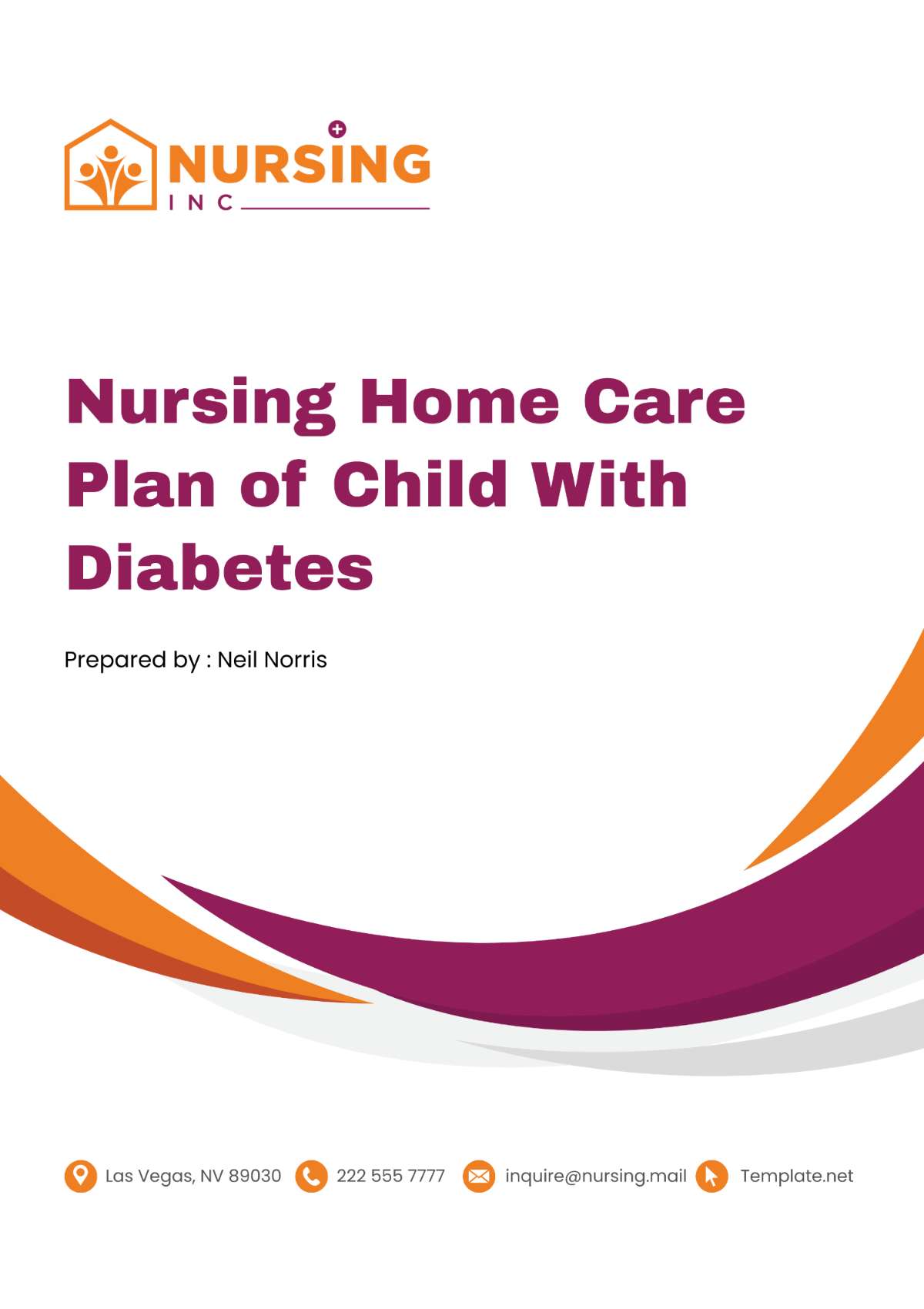Free Nursing Home Care Plan of Child With Diabetes

Introduction:
Caring for a child with diabetes requires a multidimensional approach that encompasses medical expertise, nutritional management, and continuous assessment. At [Your Company Name], we recognize the importance of understanding the complexities of pediatric diabetes and tailoring our care plans to meet the unique needs of each child. This document outlines our comprehensive care plan, focusing on understanding the child's condition, conducting diabetic assessments, and implementing nutritional management strategies.
1. Understanding the Child's Condition
Comprehensive understanding of a child's diabetic condition is the cornerstone of effective care. Diabetes, a chronic condition characterized by elevated blood sugar levels, presents unique challenges in children due to their growth and developmental needs. Our healthcare team is dedicated to staying informed about the various types of diabetes, including type 1 and type 2, as well as the less common forms such as maturity-onset diabetes of the young (MODY) and neonatal diabetes.
Education about diabetes is essential for both the medical professionals involved in the child's care and the child's family members. It is vital to understand the symptoms of diabetes, such as increased thirst, frequent urination, unexplained weight loss, and fatigue. Additionally, awareness of potential complications, including diabetic ketoacidosis (DKA), hypoglycemia, and long-term effects on organs such as the eyes, kidneys, and nerves, is crucial.
Keeping abreast of the latest research and best practices in pediatric diabetes management is essential. This includes staying informed about advancements in insulin therapy, glucose monitoring technology, and lifestyle interventions. By maintaining a comprehensive understanding of the child's condition, we can provide the highest quality of care and support to ensure their health and well-being.
2. Diabetic Assessment
The initial step in our care plan is to conduct a thorough assessment of the child's diabetes. Regular monitoring of key parameters is essential to track the progression of the disease and adjust treatment accordingly. Blood sugar levels, measured through fingerstick testing or continuous glucose monitoring, provide valuable insights into the child's glycemic control throughout the day. Monitoring for the presence of ketones in the urine is important, especially during illness or periods of high blood sugar, as it can indicate a risk of DKA.
In addition to day-to-day monitoring, regular evaluations of the child's long-term glycemic control are essential. Glycated hemoglobin (A1C) levels, measured every three months, provide an indication of average blood sugar levels over the preceding weeks to months. These assessments help to identify trends and patterns in the child's glucose control, guiding adjustments to their treatment plan as needed.
Our care team, including nursing staff and healthcare providers, collaborates closely to ensure that assessments are conducted promptly and accurately. By maintaining a proactive approach to diabetic assessment, we can identify any changes or complications early and intervene promptly to optimize the child's health outcomes.
Assessment | Frequency | Responsible Party |
|---|---|---|
Blood sugar levels | Daily, before meals and bedtime | Nursing staff |
Ketones in urine | During illness or high blood sugar | Nursing staff |
A1C levels | Every 3 months | Healthcare provider |
3. Nutritional Management
Proper nutrition plays a vital role in managing diabetes and promoting overall health in children. Our care plan includes consulting with a certified dietitian to develop a personalized meal plan tailored to the child's nutritional needs and preferences. The meal plan focuses on controlling carbohydrate intake to manage blood sugar levels effectively while ensuring a balanced mix of proteins, fibers, and healthy fats.
Special considerations are given to managing hypoglycemia and hyperglycemia through appropriate meal timing and composition. Consistency in meal schedules is essential to prevent blood sugar spikes and maintain stable glucose levels throughout the day. Proper hydration is also emphasized to support overall health and facilitate optimal metabolic function.
By incorporating nutritional management into our care plan, we aim to empower children with diabetes to make healthy food choices and maintain optimal glycemic control. Through education and support, we help children and their families navigate the complexities of diabetes management and achieve long-term success in maintaining their health and well-being.
4. Insulin Management
Insulin management is a cornerstone of diabetes treatment for many children. Proper administration of insulin is crucial in maintaining stable blood sugar levels and preventing complications associated with diabetes. At [Your Company Name], our healthcare team is dedicated to ensuring safe and effective insulin management for every child under our care.
Administering the correct dose of insulin at the right time is essential to maintaining glycemic control. Our nursing staff undergo rigorous training to accurately calculate insulin dosages based on factors such as the child's weight, carbohydrate intake, and blood sugar levels. We emphasize the importance of adhering to prescribed insulin regimens and monitoring for any changes in the child's insulin needs.
In addition to administering insulin, our healthcare team closely monitors the child's response to insulin therapy. Regular blood sugar monitoring helps track the effectiveness of insulin dosages and identify any trends or patterns in the child's glucose levels. This allows us to make timely adjustments to the insulin regimen to optimize glycemic control and minimize the risk of hypo- or hyperglycemia.
Proper disposal of syringes and other equipment is essential to prevent the spread of infections and ensure a safe environment for the child. Our nursing staff follows strict protocols for disposing of used syringes and other medical waste in accordance with regulatory guidelines and best practices.
Monitoring for signs of insulin injection site infections is another crucial aspect of insulin management. Our healthcare team educates both the child and their caregivers on how to recognize the signs of infection, such as redness, swelling, or pain at the injection site. Prompt identification and treatment of injection site infections are essential to prevent complications and promote healing.
Beyond the technical aspects of insulin management, we recognize the emotional impact that diabetes can have on a child. Our nursing home staff is trained to provide reassurance and emotional support during insulin injections, helping to alleviate any anxiety or fear that the child may experience. We strive to create a supportive and nurturing environment where children feel comfortable and empowered to manage their diabetes effectively.
5. Exercise & Physical Activity
Regular physical activity plays a vital role in the overall health and well-being of children with diabetes. Exercise helps control body weight, improve insulin sensitivity, and maintain stable blood sugar levels. At [Your Company Name], we prioritize incorporating physical activity into the daily routines of children under our care.
An appropriate exercise routine is developed based on the child's age, physical ability, and interests. This may include activities such as walking, biking, swimming, or participating in organized sports. Our healthcare team works closely with each child to tailor an exercise plan that meets their individual needs and preferences.
We emphasize the importance of consistency in physical activity to maximize its benefits for diabetes management. Children are encouraged to engage in regular exercise sessions, aiming for at least 60 minutes of moderate to vigorous activity each day. Our nursing staff monitors the child's participation in physical activity and adjusts the exercise plan as needed to accommodate any changes in their health status or abilities.
By promoting regular physical activity, we empower children with diabetes to lead active and healthy lifestyles while effectively managing their condition. Through education, encouragement, and support, we help children develop lifelong habits that promote optimal health and well-being.
6. Mental Health Care
Managing diabetes can be emotionally challenging for children, and addressing their mental health needs is essential for overall well-being. At [Your Company Name], we prioritize providing comprehensive mental health care to support children with diabetes.
Our nursing home staff undergo specialized training to provide emotional support to children coping with diabetes-related stress and anxiety. We create a positive and encouraging environment where children feel safe expressing their feelings and concerns.
Counseling services are available to children and their families to address any emotional or psychological challenges associated with diabetes. Our licensed counselors provide individualized support and guidance to help children develop coping strategies and resilience in managing their condition.
In addition to formal counseling services, we foster a supportive community where children can connect with peers facing similar challenges. Group activities, support groups, and peer mentoring programs offer opportunities for children to share experiences, gain support, and build friendships.
By addressing the mental health needs of children with diabetes, we aim to enhance their overall quality of life and empower them to effectively manage their condition with confidence and resilience. Through a holistic approach that encompasses physical, emotional, and psychological well-being, we strive to support every child in reaching their full potential.
7. Monitoring Health
Monitoring the health of children with diabetes is a continuous process that requires diligence and attention to detail. At [Your Company Name], we prioritize routine check-ups and constant monitoring to ensure the optimal management of the child's condition.
Key aspects of health monitoring for children with diabetes include:
Tracking blood glucose levels: Regular monitoring of blood glucose levels is essential for assessing glycemic control and making adjustments to treatment as needed. This may involve daily fingerstick testing or continuous glucose monitoring.
Screening for other health conditions: Children with diabetes are at increased risk for various health complications, including cardiovascular disease, neuropathy, and retinopathy. Regular screening tests, such as lipid profiles, nerve function tests, and eye exams, help identify and manage these potential complications.
Regular eye, kidney, and feet checks: Diabetes can affect various organs and systems in the body, making regular monitoring of eye, kidney, and foot health essential. Eye exams help detect diabetic retinopathy, while kidney function tests assess renal health. Regular foot exams help prevent complications such as diabetic neuropathy and foot ulcers.
Our healthcare team ensures that these monitoring activities are integrated into the child's care plan and conducted at appropriate intervals. By staying proactive in monitoring the child's health, we can identify any changes or concerns early and intervene promptly to prevent complications and optimize outcomes.
8. Training and Education
Education is a fundamental aspect of managing diabetes in children, empowering them to take an active role in their own care. At [Your Company Name], we prioritize providing comprehensive training and education to children and their families to equip them with the knowledge and skills needed to manage diabetes effectively.
Key components of training and education for children with diabetes include:
Recognizing symptoms of hypoglycemia and hyperglycemia: Children are taught to recognize the signs and symptoms of low and high blood sugar levels, such as sweating, shakiness, confusion, and thirst. This enables them to take prompt action to treat these episodes and prevent complications.
Reacting in emergency situations: Children are trained in how to respond to emergencies related to diabetes, such as administering fast-acting carbohydrates for hypoglycemia or seeking medical attention for severe hyperglycemia. This empowers them to take control of their health and safety.
Emphasizing the importance of a balanced lifestyle: Children learn about the importance of healthy eating, regular physical activity, and proper medication management in managing diabetes. They are encouraged to adopt lifestyle habits that promote optimal glycemic control and overall well-being.
Our healthcare team works closely with children and their families to ensure that training and education are tailored to their individual needs and preferences. Through ongoing support and reinforcement, we empower children to manage their diabetes with confidence and resilience.
9. Emergency Preparedness
Emergencies related to diabetes, such as severe hypoglycemia or diabetic ketoacidosis (DKA), require swift and appropriate action to prevent complications and ensure the child's safety. At [Your Company Name], we prioritize emergency preparedness to ensure that our nursing home staff is equipped to handle any diabetes-related emergencies that may arise.
Key aspects of emergency preparedness include:
Developing and practicing emergency protocols: Our healthcare team develops comprehensive protocols for managing diabetes-related emergencies, which are regularly reviewed and practiced to ensure that staff are prepared to respond effectively.
Providing ongoing training: Nursing staff undergo regular training in recognizing the signs and symptoms of diabetes-related emergencies and implementing appropriate interventions. This ensures that they are equipped with the knowledge and skills needed to respond quickly and confidently in emergency situations.
By prioritizing emergency preparedness, we can provide a safe and supportive environment for children with diabetes, minimizing the risk of complications and optimizing their health outcomes.
10. Family Involvement
Family involvement is integral to the successful management of a child's diabetes. At [Your Company Name], we recognize the importance of fostering collaboration and communication between our healthcare team and the child's family members.
Key aspects of family involvement include:
Regular interaction: We encourage open communication and regular interaction between our nursing home staff and the child's family members to ensure that everyone is informed and involved in the child's care.
Monthly meetings: Monthly meetings provide an opportunity for families to discuss the child's progress, share experiences, and collaborate on potential ways to improve the care plan. This collaborative approach helps ensure that the child receives comprehensive and coordinated care that meets their individual needs and preferences.
- 100% Customizable, free editor
- Access 1 Million+ Templates, photo’s & graphics
- Download or share as a template
- Click and replace photos, graphics, text, backgrounds
- Resize, crop, AI write & more
- Access advanced editor
Revolutionize pediatric diabetes care with our Nursing Home Care Plan of Child with Diabetes Template! From Template.net, this customizable resource empowers healthcare providers to deliver tailored care. Utilize our AI editor tool to modify plans seamlessly, ensuring precise management for young patients. Streamline workflows, enhance communication, and prioritize patient well-being with this essential tool for nursing home professionals.
You may also like
- Finance Plan
- Construction Plan
- Sales Plan
- Development Plan
- Career Plan
- Budget Plan
- HR Plan
- Education Plan
- Transition Plan
- Work Plan
- Training Plan
- Communication Plan
- Operation Plan
- Health And Safety Plan
- Strategy Plan
- Professional Development Plan
- Advertising Plan
- Risk Management Plan
- Restaurant Plan
- School Plan
- Nursing Home Patient Care Plan
- Nursing Care Plan
- Plan Event
- Startup Plan
- Social Media Plan
- Staffing Plan
- Annual Plan
- Content Plan
- Payment Plan
- Implementation Plan
- Hotel Plan
- Workout Plan
- Accounting Plan
- Campaign Plan
- Essay Plan
- 30 60 90 Day Plan
- Research Plan
- Recruitment Plan
- 90 Day Plan
- Quarterly Plan
- Emergency Plan
- 5 Year Plan
- Gym Plan
- Personal Plan
- IT and Software Plan
- Treatment Plan
- Real Estate Plan
- Law Firm Plan
- Healthcare Plan
- Improvement Plan
- Media Plan
- 5 Year Business Plan
- Learning Plan
- Marketing Campaign Plan
- Travel Agency Plan
- Cleaning Services Plan
- Interior Design Plan
- Performance Plan
- PR Plan
- Birth Plan
- Life Plan
- SEO Plan
- Disaster Recovery Plan
- Continuity Plan
- Launch Plan
- Legal Plan
- Behavior Plan
- Performance Improvement Plan
- Salon Plan
- Security Plan
- Security Management Plan
- Employee Development Plan
- Quality Plan
- Service Improvement Plan
- Growth Plan
- Incident Response Plan
- Basketball Plan
- Emergency Action Plan
- Product Launch Plan
- Spa Plan
- Employee Training Plan
- Data Analysis Plan
- Employee Action Plan
- Territory Plan
- Audit Plan
- Classroom Plan
- Activity Plan
- Parenting Plan
- Care Plan
- Project Execution Plan
- Exercise Plan
- Internship Plan
- Software Development Plan
- Continuous Improvement Plan
- Leave Plan
- 90 Day Sales Plan
- Advertising Agency Plan
- Employee Transition Plan
- Smart Action Plan
- Workplace Safety Plan
- Behavior Change Plan
- Contingency Plan
- Continuity of Operations Plan
- Health Plan
- Quality Control Plan
- Self Plan
- Sports Development Plan
- Change Management Plan
- Ecommerce Plan
- Personal Financial Plan
- Process Improvement Plan
- 30-60-90 Day Sales Plan
- Crisis Management Plan
- Engagement Plan
- Execution Plan
- Pandemic Plan
- Quality Assurance Plan
- Service Continuity Plan
- Agile Project Plan
- Fundraising Plan
- Job Transition Plan
- Asset Maintenance Plan
- Maintenance Plan
- Software Test Plan
- Staff Training and Development Plan
- 3 Year Plan
- Brand Activation Plan
- Release Plan
- Resource Plan
- Risk Mitigation Plan
- Teacher Plan
- 30 60 90 Day Plan for New Manager
- Food Safety Plan
- Food Truck Plan
- Hiring Plan
- Quality Management Plan
- Wellness Plan
- Behavior Intervention Plan
- Bonus Plan
- Investment Plan
- Maternity Leave Plan
- Pandemic Response Plan
- Succession Planning
- Coaching Plan
- Configuration Management Plan
- Remote Work Plan
- Self Care Plan
- Teaching Plan
- 100-Day Plan
- HACCP Plan
- Student Plan
- Sustainability Plan
- 30 60 90 Day Plan for Interview
- Access Plan
- Site Specific Safety Plan





























